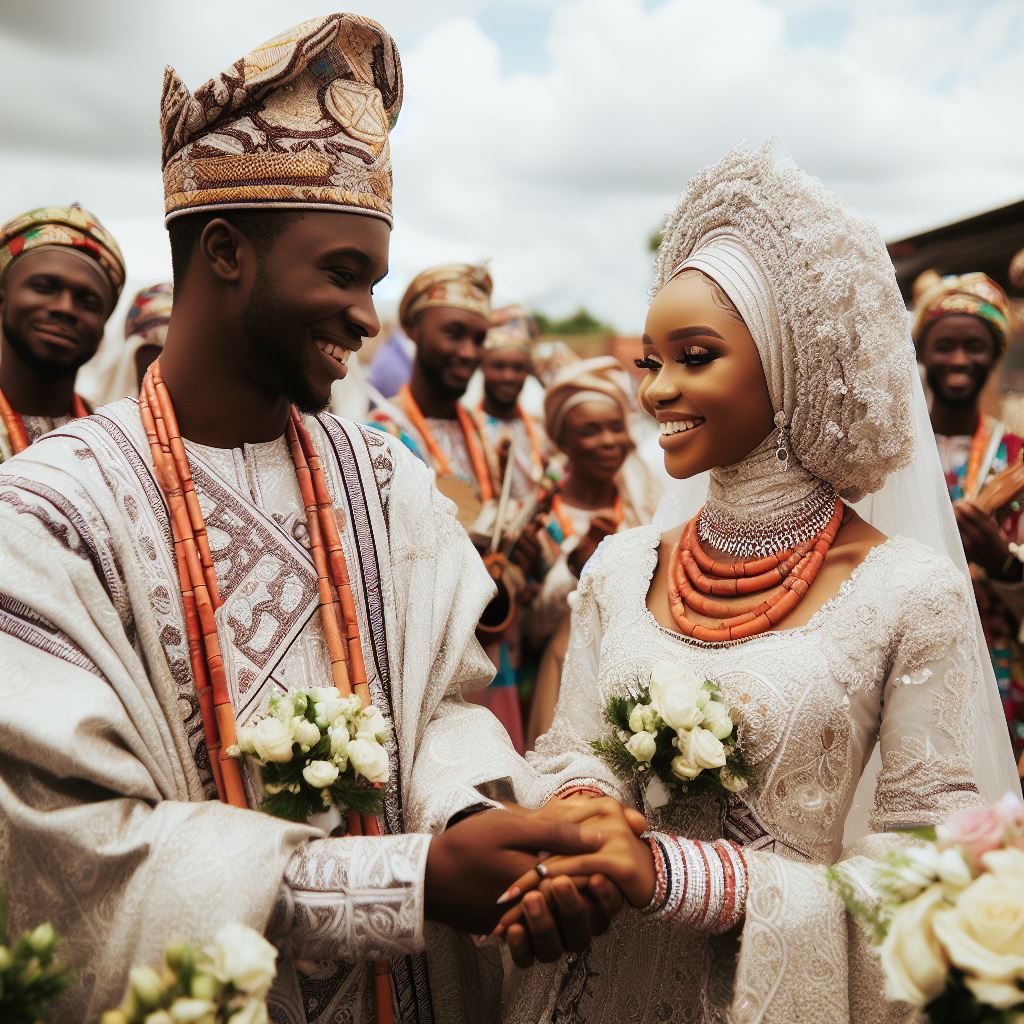The Importance of Nikah: Marriage in Islamic Tradition
Last Updated on October 16, 2023
Introduction
Marriage is a significant aspect of Islamic tradition, as it symbolizes the union between a man and a woman according to the principles of Islam.
Nikah, the Islamic marriage contract, embodies the commitment and responsibilities shared by spouses.
It is a solemn agreement that binds two individuals in a legal and spiritual bond.
The significance of marriage in Islamic tradition cannot be overstated.
It is considered a means of attaining spiritual fulfillment and building a harmonious family life.
Islam encourages marriage as a way to fulfill one’s desires in a permissible manner and to establish a stable and loving relationship based on mutual respect, love, and support.
Marriage is seen as a means to increase one’s faith and seek Allah’s blessings.
The purpose of this blog post is to shed light on the importance of Nikah as an integral part of Islamic traditions.
It aims to emphasize the role of marriage in strengthening the foundation of society, promoting family values, and fostering personal growth.
By exploring the significance of Nikah, this blog post seeks to inspire individuals to approach marriage with reverence, commitment, and a deep understanding of its value in the context of Islam.
Basically, the institution of marriage, as represented by Nikah, holds immense significance in the Islamic tradition.
It serves as a means for individuals to form a lifelong partnership, fulfill their spiritual duties, and contribute to the well-being of society.
Understanding the importance of Nikah is crucial for Muslims in upholding the teachings of Islam and nurturing healthy and fulfilling marital relationships.
The Religious Importance of Nikah
Islamic Viewpoint on Marriage
In Islam, Nikah, or marriage, holds a sacred status, a cornerstone of faith.
It’s not merely a social contract but a divine covenant.
Here’s why:
- Divine Pleasure: Allah encourages marriage to fulfill His command of populating the Earth and safeguarding one’s chastity.
- Spiritual Unity: Nikah unites two souls, creating a partnership that’s central to one’s faith and destiny.
- Protection of Virtue: It shields individuals from premarital relations, emphasizing modesty and purity.
Quranic References to Marriage
The Quran resonates with verses stressing the significance of Nikah:
- “And among His signs is this, that He created for you mates from among yourselves…” (Quran 30:21)
- “They are clothing for you and you are clothing for them.” (Quran 2:187)
- “O mankind! We created you from a single soul…” (Quran 4:1)
Hadiths Related to Nikah
Prophet Muhammad’s sayings affirm the importance of Nikah:
- “O young people! Whoever among you is able to marry, should marry…”
- “The Nikah is my Sunnah (way), and he who does not follow my way is not from me.”
- “There is no foundation that has been built in Islam more loved by Allah…”
In Islam, Nikah isn’t just a social custom; it’s a religious duty, a path towards spiritual growth, and a means to please Allah.
It’s a union blessed by the Quran and exemplified by the Prophet’s Sunnah.
Read: Sustaining Love: Key Prayers for Long-lasting Nigerian Marriages
Spiritual Benefits of Nikah
Strengthening faith and spirituality
Marriage in Islamic tradition, or Nikah, not only has societal benefits but also plays a fundamental role in strengthening one’s faith and spirituality.
Through the union of two individuals, Nikah creates a platform for spiritual growth and righteous living.
- Unity of hearts and minds: Nikah brings two individuals together, allowing them to unite their hearts and minds in a commitment to a shared Islamic lifestyle. This unity fosters a sense of spiritual connection and strengthens the bond between spouses.
- Encourages mutual support: In a Nikah, spouses are encouraged to support each other in their religious pursuits. Whether it is attending mosques, reading Quran together, or participating in Islamic activities, the couple shares a spiritual journey, providing emotional support and motivation to remain steadfast in their faith.
- Serves as a reminder of God’s presence: In Islam, marriage is seen as a means to attain closeness to Allah. By fulfilling the obligations of Nikah, couples are reminded of Allah’s presence in their lives and are encouraged to seek His guidance in their marital journey.
Fulfillment of religious obligations
Nikah is not only a social contract but also a religious obligation in Islam.
It serves as a way for Muslims to fulfill their religious duties and follow the teachings of the Prophet Muhammad (peace be upon him).
- Upholding the Sunnah: The Prophet Muhammad (pbuh) emphasized the importance of marriage and encouraged Muslims to follow his example. By entering into Nikah, individuals emulate the Sunnah and earn the blessings of Allah.
- Perpetuating the Ummah: Through Nikah, Muslims contribute to the growth and preservation of the Ummah, the global Muslim community. By raising righteous children within a marital bond, individuals ensure the continuity of Islamic teachings and traditions.
- Building a pious household: Nikah provides the foundation for establishing a pious household, where Islamic values and teachings can flourish. This enables individuals to create an environment conducive to the development of strong moral character and a deep spirituality.
Protection from temptation and sins
In a world filled with temptations and distractions, Nikah offers protection from indulging in sinful behavior.
It provides a safeguard against immoral acts and promotes a chaste and righteous way of life.
- Promotes modesty and chastity: Nikah encourages individuals to maintain modesty and chastity by fostering a sense of responsibility and commitment to their partners. This commitment helps in guarding oneself against engaging in illicit relationships or actions.
- Shields from harmful desires: Marriage in Islam provides a legitimate and halal outlet for fulfilling one’s desires. By establishing a lawful relationship, Nikah acts as a shield against engaging in activities that are prohibited in Islam, such as premarital or extramarital relationships.
- Offers emotional stability: Being in a committed marriage offers emotional stability, reducing the likelihood of seeking solace in forbidden avenues. The love, care, and support found within a Nikah act as protective barriers, helping individuals stay on the righteous path.
Generally, Nikah, or Islamic marriage, holds significant spiritual benefits for individuals and the Muslim community as a whole.
It strengthens faith and spirituality by fostering unity, mutual support, and a reminder of Allah’s presence.
Additionally, Nikah fulfills religious obligations, perpetuates the Ummah, and builds pious households.
By providing protection from temptation and sins, Nikah promotes chastity, modesty, and emotional stability.
Embracing the institution of Nikah leads to a deeper connection with Allah and a fulfilling spiritual journey.
Read: Marriage Challenges? Here’s a Prayer Guide for Nigerian Couples
Social Importance of Nikah
Building a family unit within Islamic values
- Marriage is a fundamental aspect of Islamic tradition, as it allows individuals to establish a family unit.
- Nikah not only provides a legal framework for a union but also promotes strong moral values.
- It emphasizes the importance of trust, love, and respect within a marriage, contributing to a healthy family life.
- By adhering to Islamic teachings, couples can create a harmonious environment, instilling discipline and responsibility in their children.
- The family unit formed through Nikah serves as the foundation of a society built on love and compassion.
Strengthening the Muslim community
- Nikah plays a significant role in strengthening the bond between Muslim individuals and their community.
- By entering into marriage, Muslims actively participate in building a cohesive society.
- Married couples can seek guidance and support from their community members, fostering a sense of belonging.
- This interconnectedness creates a network of relationships that assists in times of need, promoting unity among Muslims.
- By strengthening the Muslim community, Nikah helps in combating social issues and challenges collectively.
Preserving cultural traditions and heritage
- Nikah is not only about the union of two individuals but also the merging of cultures and traditions.
- Through marriage ceremonies, cultural heritage is preserved and passed down to future generations.
- Weddings provide an opportunity to showcase unique traditions, rituals, and customs.
- By celebrating and preserving cultural values, Nikah reinforces the pride and identity of Muslim communities.
- These cultural traditions foster a sense of belonging and serve as a source of connection for individuals.
Essentially, the social importance of Nikah in Islamic tradition cannot be overstated.
It plays a vital role in building strong family units, strengthening the Muslim community, and preserving cultural heritage.
Through Nikah, individuals establish a solid foundation for a harmonious society, based on love, trust, and shared values.
By actively participating in this sacred institution, Muslims contribute to the overall welfare and unity of the community.
Nikah serves as a means to uphold cultural traditions, ensuring their longevity in an ever-changing world.
Read: Prayers for Every Season of Your Nigerian Marriage Journey

Emotional and Psychological Benefits of Nikah
Providing companionship and love
- Nikah, or marriage, allows individuals to experience companionship and love.
- Having a life partner provides emotional support, understanding, and a sense of belonging.
- Sharing life’s ups and downs with a spouse can lead to a deeper emotional connection.
- Companionship fosters happiness, contentment, and fulfillment in one’s life.
Emotional support in times of difficulty
- Marriage offers a strong support system during challenging times.
- When facing adversity, having a spouse can provide comfort, encouragement, and reassurance.
- Sharing burdens with a life partner helps to alleviate stress and anxiety.
- Emotional support from a spouse can contribute to better mental health and overall well-being.
Creating a sense of security and stability
- Nikah brings a sense of security, both emotionally and financially.
- Knowing that there is a committed partner who will always be there offers peace of mind.
- Marriage provides stability in terms of shared responsibilities, decision-making, and planning for the future.
- Feeling secure and stable in a relationship fosters a positive state of mind.
In a nutshell, marriage, or Nikah, offers numerous emotional and psychological benefits.
It provides companionship, love, and emotional support, creating a sense of security and stability in one’s life.
Read: Intimacy Beyond Words: Incorporating Prayer in Marital Life
Legal and Financial Benefits of Nikah
Legal recognition of marital rights and responsibilities
- Nikah provides legal protection and recognition to the marriage contract.
- Both spouses gain legal rights and responsibilities towards each other.
- It establishes the legitimacy of the relationship and safeguards the rights of the couple.
- The contract includes terms of custody, divorce, and division of assets.
- Legal frameworks ensure the enforcement of the rights and obligations laid down in Nikah.
Financial protection for both spouses
- Nikah ensures financial support and maintenance for both partners in the marriage.
- Husbands have the obligation to provide for their wives financially.
- Wives have the right to seek financial support from their husbands, promoting gender equality.
- Marriage contracts can outline financial agreements, including joint bank accounts or property sharing.
- Financial stability within a marriage fosters a harmonious and secure family environment.
Inheritance rights and financial security for children
- Nikah grants inheritance rights and financial security to children born within wedlock.
- Islamic law ensures that children are provided for financially after the death of their parents.
- The marriage contract can specify the division of assets and inheritance distribution.
- Children are protected from potential disputes and financial uncertainties.
- Financial security allows children to have a stable upbringing and a promising future.
Legal and financial benefits associated with Nikah contribute towards the stability and well-being of a family.
By legally recognizing marital rights and responsibilities, Nikah establishes a solid foundation for a successful marriage.
Spouses are protected by the law, ensuring their rights are upheld, and disputes are resolved in a fair manner.
Financial protection provided by Nikah safeguards the interests of both partners, promoting a balanced partnership within the marriage.
Furthermore, the inclusion of inheritance rights and financial security for children guarantees a secure future for the family.
In general, Nikah plays a vital role in providing legal and financial benefits to couples in Islamic tradition.
It not only establishes the rights and responsibilities of both spouses but also ensures their well-being and stability.
Marriage is not only a personal commitment but also a legally and financially binding contract that fosters a strong and secure family unit.
It is imperative to understand and appreciate the importance of Nikah in preserving family
Conclusion
Marriage holds significant value in Islamic tradition.
It is a sacred bond between two individuals that promotes stability, companionship, and the fulfillment of religious obligations.
Encouragement to prioritize marriage in Islamic tradition
Muslims are encouraged to prioritize marriage as it provides a framework for nurturing love, raising a family, and building a strong community.
It also safeguards against immoral behaviors and strengthens the spiritual connection between spouses.
Closing thoughts
Marriage in Islamic tradition is not merely a social institution but a deeply spiritual commitment.
It offers countless benefits for individuals, families, and the society at large.
By upholding its importance, we ensure the preservation of love, harmony, and the teachings of Islam.
In essence, Nikah holds immense importance in Islamic tradition. It is a sacred union that brings individuals closer to God, fulfill their duties, and creates a thriving society.
As believers, it is our duty to encourage and prioritize marriage, understanding its significance in establishing a blissful and righteous life.
Through the practice of Nikah, we can experience blessings in this world and the hereafter.


